Did Carbon Actually Score A Quiet Win In Congress?
When Congress approved the Fiscal Year 2026 spending bills last month, many in the carbon sector braced for cuts but reality appears more optimistic.
Current Access Level “I” – ID Only: CUID holders, alumni, and approved guests only
As the energy landscape continues to transform–from the rapid growth rates of low-carbon fuels to questions about the future of oil demand to a more integrated global gas market–it is important to understand the trends and developments driving this change. The Center on Global Energy Policy hosted a presentation on BP’s Statistical Review of World Energy 2017 with Spencer Dale, Group Chief Economist. After the presentation, CGEP Director Jason Bordoff moderated a conversation where Mr. Dale was joined by Antoine Halff, Sr. Research Scholar at the Center on Global Energy Policy, and Amy Myers Jaffe, Executive Director of Energy and Sustainability at the UC Davis Graduate School of Management.
As political support for clean energy has waxed and waned over the past twenty years, so has the government’s financial backing. In the 2010s, critics pointed to the...

With electricity prices on the rise, the future of our power grid is attracting a lot more attention. Surging demand is at the center of the story, but...

From the affordability crisis and the data center boom, to the US government’s campaign to reinvigorate the Venezuelan oil market, energy is dominating headlines in unusual ways. And...

Great power competition—particularly between the United States and China—is intensifying. This rivalry is reshaping everything from technology supply chains and energy security to the future of artificial intelligence. ...

Iran appears to be a natural gas giant, due to its large proved gas reserves and significant gas production and consumption.

Venezuela holds 70% of Latin America's natural gas reserves, which it could export to Colombia and Trinidad to increase revenues.

Geopolitical uncertainty associated with Russian gas exports could swing the range of those exports by an estimated 150 bcm per year.

